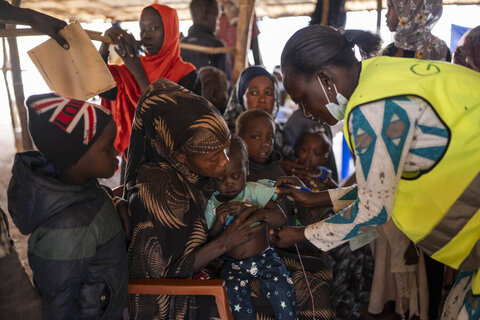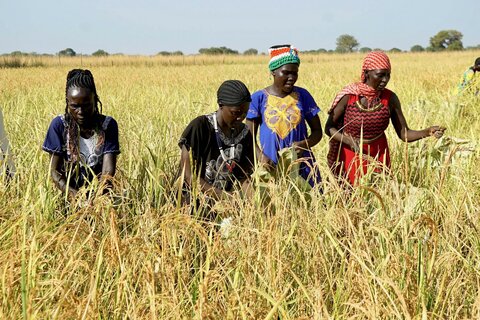‘There is no unity among people when you are hungry’

Story by Daniel Hassan
"We were a happy family in South Sudan. But in those times of insecurity, there was no education and no food. I came to Uganda because of war and hunger.
You know when someone is feeling hungry, you see their face is not smiling. You can feel annoyed and not good with the people around you. You don't care about others and you don't feel ok. There's no unity among people when you're hungry.
My father died in 2009 when I was still very young. He was taken by Kony's soldiers and after two months he was killed. My uncle then took care of me and sent me to school in Juba.
Whenever I was in bed at night I could hear gunshots, I was not confident, not knowing when they will come to us. And one night they came. The war broke out at a checkpoint in Juba, we found dead bodies in our compound. We were really fearing.
Life was too hard there. We really faced hunger in South Sudan because during the war — the prices of things increased in the market and there is no money during the time of war. We couldn't afford food but also the supply of food was cut off. My uncle had a very big shop, so we could survive from the money from that for a time. He employed people, I worked there on weekends. But because of hunger, there was no way out, so we had to start eating all the things in the shop.
Once there was nothing left, I came here to Uganda — together with my uncle and cousins. By the time I arrived at the border in Elegu on 9 August 2016, there were no gun shots, there was peace, and I really felt safe and free. I was reunited with my mother, brothers and sisters and we are building another shop here now. We get food from WFP and grow some maize on a small piece of land.

I dream to be a great photographer. I really like photos, you know. I always make the use of my legs, kneeling, moving around to get the best shot. I am happy to be a WFP storyteller as I want other people to hear about my life here in Bidibidi.
When peace comes in South Sudan, the hunger will not be there. Your motherland is always your motherland. I love my country and when peace comes, I will be the first one to go. And I want to be there as one of the first taking photos of everyone celebrating that moment when peace comes."
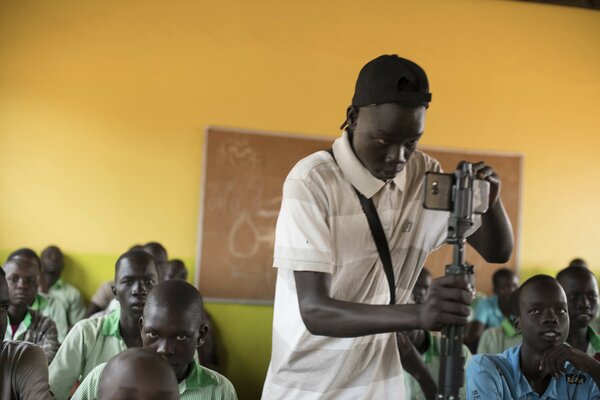
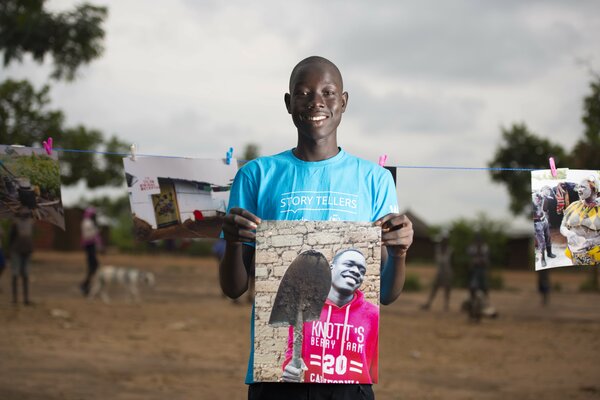

Story by Mamcy Karina
"The war finally came to us on a day in July 2016 at 9am. There was a soldier near my house calling my uncle's name — he was threatening to burn our house. Others were crying. We didn't know war was going to come. He was wearing a coat with a gun.
Soon we couldn't go out into the garden to dig for food anymore, also getting money was a problem. We faced hunger. When you're as hungry as I was, you can think of even dying. To get food my father had to sell all his cows. But even that wasn't enough to feed a family as big as mine.
Eventually, my father sent me to Uganda. I came with my younger sister Jeanette and brother Daniel. We got a vehicle, we closed all the windows and came slowly. There were vehicles set on fire and burning and we had to keep quiet, I was panicking all along the way. At last, when we passed the river I heard our driver say "thank god we are now alive. We have reached safety— Nimule." I had never heard of the place before.
We were stuck for two weeks in the reception centre — it was packed — food and water was a problem. As soon as I came to Bidibidi, WFP gave us beans, maize, oil and we felt better. I got pregnant a few months later, and had to leave school to have Godfrey. I will go back and get an education once he is crawling and my mother can take care of him.

I feel happy here in Uganda, we can get food, no war and no running from one place to another with the sound of gun shots. Lunch and supper is okay and more than we ate back in South Sudan. During the war there, we could only eat three times in a month.
If peace can come in South Sudan, things will be easier — we can dig and get food.
I dream to become a journalist in the future to know more about people in the world and a leader in my community. Because of WFP Storytellers, I know how to shoot video, I had never done that before. It was a lot of fun and now I know how to stand and how to shoot video properly I hope people will see it and enjoy it.
I like telling stories so they know what is going on here in Bidibidi and in South Sudan — because they have heard it from me — Mamcy Karina. I want people to know more about me and how I am living."
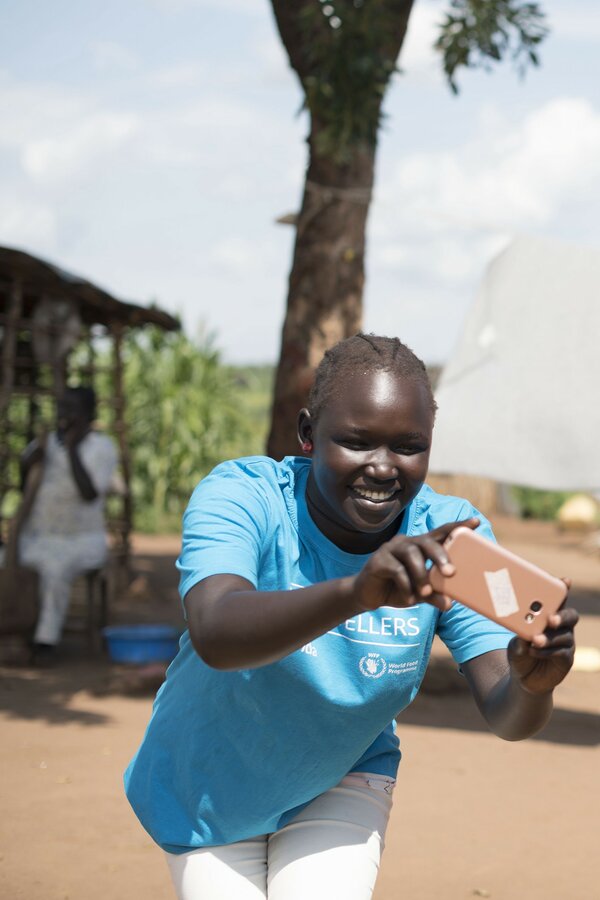
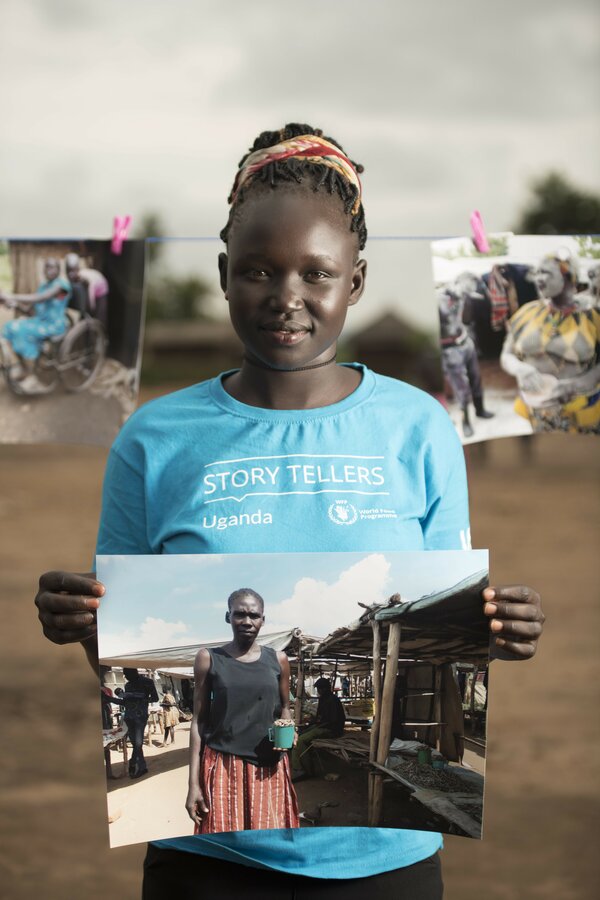
Conflict and insecurity are the primary drivers of hunger
We will never eliminate hunger without peace in the world. Millions of people caught up in armed conflict face the threat of famine. Food security really does depend on security.
In war-torn countries, where agriculture and trade is disrupted and the economy collapses, the cost of a simple, nutritious plate of food can be more than a day's wages. In South Sudan, for example, it could be the equivalent of a New Yorker having to pay US$321 for a modest lunch — say a plate of bean stew — cooked at home.
Uganda has welcomed more than half of the South Sudanese population which has fled conflict and hunger since July 2016. As well as providing food assistance, WFP brings storytelling into people's lives, so that real voices can be heard on the vital importance of food and the impact of hunger.
Daniel and Karina are two of the 34 young South Sudanese refugees who WFP trained on storytelling in Bidibidi refugee settlement in Uganda. In a two-week workshop, the students learnt how to take good photos, shoot video and share their stories on social media sites such as Facebook and Instagram — so that they can share their stories with the world.

